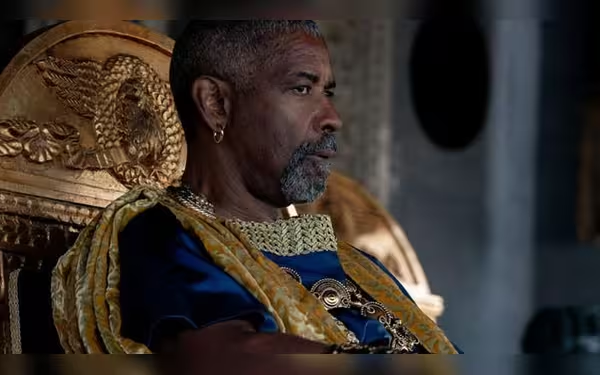Thursday, November 21, 2024 09:44 AM
Denzel Washington's Controversial Role in Gladiator II Sparks Debate
- Denzel Washington's kiss scene cut from Gladiator II.
- Ridley Scott refutes Washington's claims about the scene.
- Discussion on LGBTQ+ representation in Hollywood intensifies.
 Image Credits: geo
Image Credits: geoDenzel Washington addresses the controversy over a cut kiss scene in Gladiator II, igniting discussions on LGBTQ+ representation in Hollywood.
Denzel Washington, a celebrated actor known for his powerful performances, recently found himself at the center of a controversy surrounding his role in the highly anticipated film "Gladiator II." The issue arose when Washington revealed that a same-gender kiss he filmed was cut from the final version of the movie. This revelation has sparked significant discussion among fans and critics alike, raising questions about representation and creative choices in Hollywood.
During the film's premiere in Los Angeles, Washington was approached by Melvin Robert from Extra, who inquired about the omitted scene. In response, Washington downplayed the situation, stating, "It wasn't even a big deal, really." To emphasize his point, he affectionately kissed his wife, adding, "That's about what it was. And I kissed him on the hands." This light-hearted approach seemed to suggest that the kiss was not as controversial as it has been portrayed.
However, Washington's earlier comments to Gayety stirred the pot further. He remarked, "I think they got chicken. I kissed a guy full on the lips and I guess they weren't ready for that." These statements caught the attention of filmmaker Ridley Scott, who quickly refuted Washington's claims at the premiere, asserting, "No, that's ********. They never did. They acted in the moment—it didn't happen." This back-and-forth has left many wondering about the dynamics of creative decisions in film production.
Additionally, sources close to the production revealed to TMZ that Washington had improvised the scene, which was not originally included in the script. This raises an interesting point about the role of actors in shaping their characters and the narratives they portray. It also highlights the ongoing conversation about the representation of LGBTQ+ relationships in mainstream cinema.
As the debate continues, it is essential to consider the broader implications of such controversies. The film industry is evolving, and discussions about inclusivity and representation are more important than ever. While Washington's comments may have been intended to be light-hearted, they underscore a significant issue that resonates with many viewers. As audiences, we must remain engaged and thoughtful about the stories being told on screen and the voices that are included in those narratives.













